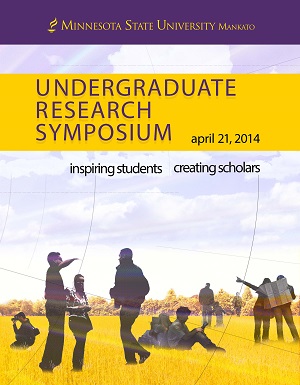Decision Making Under Uncertainty
Location
CSU Ballroom
Start Date
21-4-2014 2:00 PM
End Date
21-4-2014 3:30 PM
Student's Major
Psychology
Student's College
Social and Behavioral Sciences
Mentor's Name
Emily Stark
Mentor's Email Address
emily.stark@mnsu.edu
Mentor's Department
Psychology
Mentor's College
Social and Behavioral Sciences
Description
People make hundreds of decisions every day, and very little is known about how they do this. A big question in decision-making is how people make decisions when faced with uncertainty. It has been shown by Tversky and Kahneman (1981) that people are affected by the framing effect when faced with an uncertain decision. This experiment was designed to look at the effects of providing a rationale for an uncertain decision, and also looked if being a rational or intuitive thinker affected the decisions. This study included an online survey of two loss of life questions and two monetary gamble questions that were framed either positively or negatively. Some participants were asked to justify their answer before submitting it, another group were asked to justify their answers after they were submitted, and the last group was not asked to submit a justification. After the four questions, everyone took survey that showed whether he or she tended to think emotionally or rationally. Preliminary analyses of the results show that frame did affect choice as predicted, but the effect of personality traits on choice is less clear.
Decision Making Under Uncertainty
CSU Ballroom
People make hundreds of decisions every day, and very little is known about how they do this. A big question in decision-making is how people make decisions when faced with uncertainty. It has been shown by Tversky and Kahneman (1981) that people are affected by the framing effect when faced with an uncertain decision. This experiment was designed to look at the effects of providing a rationale for an uncertain decision, and also looked if being a rational or intuitive thinker affected the decisions. This study included an online survey of two loss of life questions and two monetary gamble questions that were framed either positively or negatively. Some participants were asked to justify their answer before submitting it, another group were asked to justify their answers after they were submitted, and the last group was not asked to submit a justification. After the four questions, everyone took survey that showed whether he or she tended to think emotionally or rationally. Preliminary analyses of the results show that frame did affect choice as predicted, but the effect of personality traits on choice is less clear.
Recommended Citation
Person, Carter. "Decision Making Under Uncertainty." Undergraduate Research Symposium, Mankato, MN, April 21, 2014.
https://cornerstone.lib.mnsu.edu/urs/2014/poster_session_B/41




